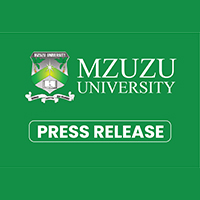By Ziliro Mchulu
In a bid to understand the status and role of African spiritualties in health decision making in Malawi, a team of academics comprising members from the Faculty of Humanities and Social Sciences and Faculty of Science Technology and Innovation has embarked on a research project on “African Spiritualties and Biomedical Approaches to healing and health in the context of COVID-19 and HIV& AIDS in Malawi”. The three-year project is being funded by The Nagel Institute.
At the project’s roll-out event held on 3rd November, 2021, Project team leader, Associate Professor Rachel Fiedler described the project as a milestone in Theology research since the project is coming at a time when there is an interplay between spirituality, traditional knowledge healing and industrial biomedical products in the country with outbreak of COVID 19 pandemic.
The project team comprises Dr Felix Nyika, Dr Joyce Mlenga, and Dr Rhodian Munyenyembefrom the Department of Theology and Religious Studies Department, Dr Joshua Kumwenda from the Department of Language, Cultural and Creative Studies, Dr Atipatsa Kaminga from the Department of Mathematical Sciences and Statistics, and Associate Professor Fiedler who is the team leader.
“The study is being done to respond to the university’s needs and aspirations of having a curriculum that responds to the needs of the nation while fusing traditional theology to address issues. It will further help in developing a TRS curriculum which will respond to the needs of the people,” said Associate Professor Fielder. According to the project leader, the study will be conducted across the country by the six researchers in a bid to have a national-wide representation.
The event which was attended by post-graduate students and members of staff from the Faculty of Humanities and Social Sciences not only created a platform for discussion and input from the audience, but also allowed post-graduate students to present their research concept notes. In the three years, the project will extend its realms to impart research skills in both undergraduate and postgraduate students.
However, the project has not been spared by COVID-19 tremors. For instance, the project team is yet to be visited by the principal advisor from Kenya as a consequence of COVID-19 travel restrictions. This has further delayed the official introduction of the project to the stakeholders.
“This event was meant to inform our post-graduate students to keep them updated and possibly engage them where necessary,” said Fielder. Apart from listening to the presentations, the audience appreciated and sampled various publications in Theology.
The team believes that this ground-breaking study will shape a new narrative of African spirituality in a biomedical age where Africa is at a complex stage of having to strike a balance between reliance on modern medicine and African indigenous knowledge coupled with spirituality.



